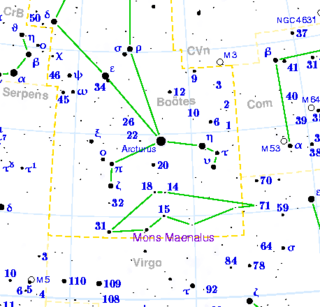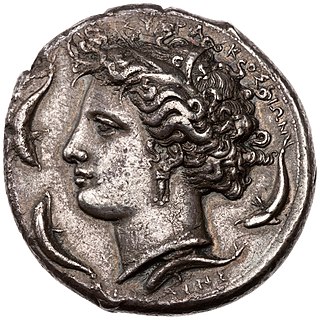Maenalus could refer to:
- Maenalus (town), a town of ancient Arcadia
- Maenalus (mythology), an Arcadian prince son of Lycaon (king of Arcadia)
- Mainalo, a mountain in Arcadia
Maenalus could refer to:

Arcadia is one of the regional units of Greece. It is part of the administrative region of Peloponnese. It is in the central and eastern part of the Peloponnese peninsula. It takes its name from the mythological figure Arcas. In Greek mythology, it was the home of the god Pan. In European Renaissance arts, Arcadia was celebrated as an unspoiled, harmonious wilderness.
Hippomedon may refer to several figures in Greek mythology:
Arcadia may refer to:

Agathos Daimon originally was a lesser deity (daemon) of classical ancient Greek religion and Graeco-Egyptian religion. In his original Greek form, he served as a household god, to whom, along with Zeus Soter, libations were made after a meal. In later (post-)Ptolemaic antiquity he took on two partially distinct roles; one as the Agathos Daimon a prominent serpentine civic god, who served as the special protector of Alexandria. The other as a genus of serpentine household gods, the Agathoi Daimones, individual protectors of the homes in which they were worshipped.

Mainalo is the tallest mountain in the Menalon highlands of the Peloponnese, and is located in Arcadia, Greece. In antiquity, the mountain was especially sacred to Pan.
Maenalus or Mainalos was a town of ancient Arcadia, and the capital of the district Maenalia (Μαιναλία), which formed part of the territory of Megalopolis upon the foundation of the latter city. Maenalus was in ruins in the time of Pausanias, who mentions a temple of Athena, a stadium, and a hippodrome, as belonging to the place.

Mons Maenalus was a constellation created by Johannes Hevelius in 1687. It was located between the constellations of Boötes and Virgo, and depicts a mountain in Greece that the herdsman is stepping upon. It was increasingly considered obsolete by the latter half of the 19th century. Its brightest star is 31 Boötis, a G-type giant of apparent magnitude 4.86m.
Alea or ALEA may refer to:

Arcadia is a region in the central Peloponnese. It takes its name from the mythological character Arcas, and in Greek mythology it was the home of the gods Hermes and Pan. In European Renaissance arts, Arcadia was celebrated as an unspoiled, harmonious wilderness; as such, it was referenced in popular culture.
"The Tree" is a macabre short story by American horror fiction writer H. P. Lovecraft. It was written in 1920, and published in October 1921 in The Tryout. Set in ancient Greece, the story concerns two sculptors who accept a commission with ironic consequences.

In Greek mythology, Lycaon was a king of Arcadia who, in the most popular version of the myth, killed and cooked his son Nyctimus and served him to Zeus, to see whether the god was sufficiently all-knowing to recognize human flesh. Disgusted, Zeus transformed Lycaon into a wolf and killed his offspring; Nyctimus was restored to life.

In Greek mythology, Arethusa was a nymph who fled from her home in Arcadia beneath the sea and came up as a fresh water fountain on the island of Ortygia in Syracuse, Sicily.
Helisson was a town in ancient Arcadia, Greece. It was situated in the district Maenalia, situated on Mount Maenalus near the territory of Mantineia, near the source of the river Helisson, a tributary of the Alpheius. According to Greek mythology, the town was founded by Helisson, a son of Lycaon.

The term Golden Age comes from Greek mythology, particularly the Works and Days of Hesiod, and is part of the description of temporal decline of the state of peoples through five Ages, Gold being the first and the one during which the Golden Race of humanity lived. After the end of the first age was the Silver, then the Bronze, after this the Heroic age, with the fifth and current age being Iron.
Oresthasium or Oressthasion, or Orestheium or Orestheion (Ὀρέσθειον), or Oresteium or Oresteion (Ὀρέστειον), was a town in the south of ancient Arcadia, in the district of Maenalia, a little to the right of the road leading from Megalopolis to Pallantium and Tegea. It was, according to myth, founded by Orestheus, King of Arcadia, but it was also mythologically connected to Orestes. In historical times, it formed part of the territory of Maenalus, but, upon the foundation of Megalopolis in 371 BCE, Oresthasium was abandoned and incorporated into Megalopolis. Its territory is called Oresthis by Thucydides, and in it was situated Ladoceia, which became a suburb of Megalopolis.
Nicodamus was a sculptor from Maenalus in Arcadia, who made statues of the Olympic victors Androsthenes, Antiochus of Arcadia, and Damoxenidas; one of the goddess Athena, in bronze and carrying her helmet and aegis, dedicated by the Eleans; and one of Hercules, as a youth, killing the Nemean lion with his arrows, dedicated at Olympia by Hippotion of Tarentum.

Battus was a figure in Greek mythology who witnessed Hermes stealing Apollo's cattle in Maenalus in Arcadia.
Sumatia or Soumatia, or Sumetia or Soumetia (Σουμητία), also known as Sumateium or Soumateion (Σουμάτειον), or Sumeteia or Soumeteia (Σουμήτεια), was a town of ancient Arcadia in the district Maenalia, on the southern slope of Mount Maenalus. According to Greek mythology, Sumatia was founded by Sumateus, a son of Lycaon. Pausanias says that Sumatia was one of the towns in the territory of Maenalus, and was one of the towns that united to form Megalopolis.
Lycoa or Lykoa, was a town in ancient Arcadia in the district Maenalia, at the foot of Mount Maenalus, with a temple of Artemis Lycoatis. It was in ruins in the time of Pausanias.
In Greek mythology, Maenalus was an Arcadian prince as one of the 50 sons of the impious King Lycaon either by the naiad Cyllene, Nonacris or by unknown woman. He was the founder of Maenalus which was the most famous of the cities of Arcadia in ancient times.